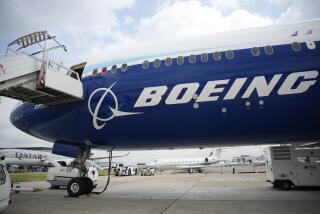Boeing Says It Should Avoid U.S. Sanctions
- Share via
Boeing Co. said Thursday that it should be immune from any penalties or sanctions arising from allegations by the State Department that its El Segundo-based satellite unit illegally provided China with sensitive space technology in the mid-1990s.
Boeing’s statement came after the State Department last week ratcheted up pressure on the aerospace giant by issuing it a “charging letter.”
The 34-page document, described as a first step in filing formal charges, accused the company’s satellite-making unit of transferring rocket technology information that could have helped the Chinese develop ballistic missiles.
If formal action is taken, Boeing could face up to $60 million in fines and be barred from selling certain satellite technology overseas for three years.
But Boeing, which was drawn into the dispute when it bought the El Segundo operations from Hughes Electronics Corp. in 2000, said that under its acquisition agreement, Hughes “retained responsibility for resolving these China matters and for paying any resulting fines and penalties.” Hughes, a unit of General Motors Corp., sold most of its aerospace operations to Boeing for $3.7 billion.
“It is important to remember that these charges relate to events that occurred in the 1990s when Hughes Space & Communications Co. was under different management and before Boeing acquired the satellite business,” said Randy Brinkley, president of Boeing Satellite Systems.
A Hughes spokesman declined Thursday to say which company ultimately would be responsible, but he noted that lawyers for Boeing and Hughes still were talking with the State Department to resolve the case.
Hughes has long denied any wrongdoing in the matter, which has dragged on for years; an earlier criminal probe was dropped by the Justice Department.
In a media briefing Thursday, State Department spokesman Richard Boucher said that although Boeing “bought the company from Hughes after all this had happened ... they’re still the responsible party to respond to these claims.”
The State Department’s charging letter detailed 123 alleged violations of military export rules. Boeing and Hughes have 30 days to respond to the letter before the case goes to an administrative law judge, who then must forward a recommendation for possible penalty or sanctions to a senior State Department official.
It was not immediately clear how much of the satellite-making business could be affected by potential restrictions on exports, although aerospace analysts noted that any such sanctions could be muted by the worldwide slump in demand for satellites.
The case arose from a series of failed rocket launches in China starting in 1995. Hughes and another satellite company, Loral Space & Communications Ltd., were accused of giving Chinese engineers detailed information about rocket systems as a way to help the Chinese figure out why their launches were failing.
In the charging letter, the State Department alleged that Hughes executives helped China repair a launch facility, identified mechanical problems with a rocket and analyzed telemetry data from a failed launch. In another incident, according to the State Department, Hughes failed to disclose that a Chinese translator it hired was the son of an influential Chinese general.
The allegations are at the heart of an intense debate over what kind of controls should be in place for exporting commercial satellite technology. Amid a furor in the late 1990s over concerns that the U.S. was too lax in approving such exports to China, Congress enacted much tougher restrictions.
But in recent years, with satellite makers complaining that the new rules have hurt sales overseas, some members of Congress have been looking to ease the regulations.
On Thursday, some space analysts raised doubts that the State Department would take any formal action against Boeing or Hughes, noting that a similar charging letter was issued before it reached a settlement with Loral. The company eventually agreed to pay $14 million and spend $6 million on internal steps aimed at boosting its compliance with export-control laws.
“I see it as a step toward settling the whole thing,” said Marshall H. Kaplan, director of space programs for research firm Strategic Insight Ltd.
More to Read
Inside the business of entertainment
The Wide Shot brings you news, analysis and insights on everything from streaming wars to production — and what it all means for the future.
You may occasionally receive promotional content from the Los Angeles Times.










